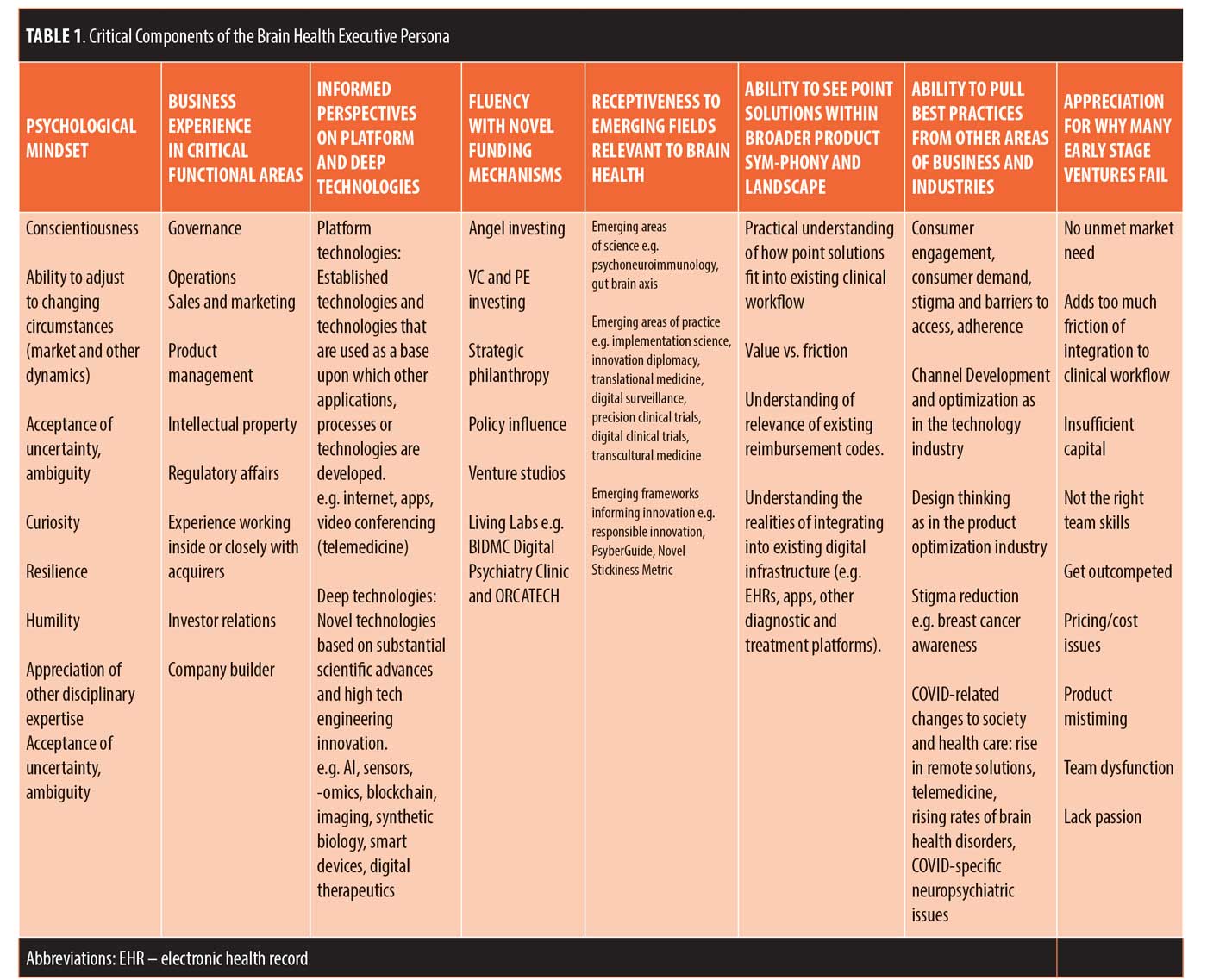 by Harris A. Eyre, MBBS (hons.), PhD; Michael Berk, MD, PhD; Erin Smith; Jeffrey Cummings, MD, ScD; and Mark Heinemeyer, MSc
by Harris A. Eyre, MBBS (hons.), PhD; Michael Berk, MD, PhD; Erin Smith; Jeffrey Cummings, MD, ScD; and Mark Heinemeyer, MSc
Dr. Eyre and Mr. Heinemeyer are co-founders of the PRODEO Institute. Dr. Eyre is with the PRODEO Institute in San Francisco, California; the Institute for Mental and Physical Health and Clinical Translation (IMPACT) and School of Medicine at Deakin University in Geelong, Australia; the Global Brain Health Institute (GBHI) at the University of California, San Francisco; the Department of Psychiatry at Baylor College of Medicine in Houston, Texas; Trinity University in Dublin, Ireland, and Neuroscience-inspired Policy Initiative at the Organisation for Economic Co-Operation and Development (OECD) in Paris, France. Dr. Berk is with IMPACT and School of Medicine at Deakin University in Geelong, Australia; the University of Melbourne’s Department of Psychiatry, Orygen Youth Health, and The Florey Institute for Neuroscience and Mental Health in Victoria, Australia; and the Brainstorm Laboratory for Mental Health Innovation at Standord University in Palo Alto, California. Ms. Smith is with Stanford University in Palo Alto, California; the GBHI at the University of California, San Francisco; and OECD in Paris, France Dr. Cummings is with the Chambers-Grundy Center for Transformative Neuroscience, Department of Brain Health, and the School of Integrated Health Sciences at the University of Nevada in Las Vegas, Nevada. Mr. Heinemeyer is with the PRODEO Institute in San Francisco, California.
FUNDING: No funding was provided for this study.
DISCLOSURES: MB is supported by a NHMRC Senior Principal Research Fellowship (1059660 and 1156072).
ABSTRACT: Given the rapidly evolving landscape of technologies, social, health, and consumer trends, the development of effective Brain Health Executives is a key workforce innovation. Convergence Brain Health involves the integration of scientists, clinicians, bioinformaticists, global health experts, social scientists, engineers, technology entrepreneurs, medical educators, caregivers, and consumers. Synergy between government, academia, and industry is also vital. The discipline of Brain Health Executives provides a novel workforce approach to ensure we have individuals who can meet the demands of Convergence Brain Health. The optimal persona of an effective Brain Health Executive will include these core elements: a certain mindset, sufficient clinical experience to understand clinical realities and research experience to understand methodology and process, business experience in critical functional areas, informed perspectives on platform design and deep technologies in brain health, fluency with novel funding mechanisms, a progressive interest in the emerging fields across brain health, the ability to see where point solutions fit within broader product symphonies and the brain health landscape, and the facility to apply proven business and commercialization practices from not only other fields of medicine, but other industries. Promising initiatives for training and workforce development, such as Stanford University Brainstorm Mental Health Innovation Lab and the Global Brain Health Institute, may serve as predicates for the novel Brain Health Executive model. Small, agile, highly collaborative, and emotionally intelligent teams may help form the ideal Brain Health Executives in the short-term. This commentary explores the discipline of convergence of science and its role in addressing the current global brain health crisis.
Keywords: Brain health, technology, innovation, entrepreneurship, psychiatry, mental disorders, neuroscience, leadership, management
Innov Clin Neurosci. 2021;18(4–6):XXXXX
Fresh thinking is needed to solve the unprecedented complexities and challenges associated with the current global brain health crisis.1 Modern brain health problems are characterized by their complexity, overlapping risks, mechanisms and treatment, multisystemic nature, and broad societal impact, and siloed approaches of thinking and innovation are poorly suited to address these problems.2 Convergence science, also known as transdisciplinary science, integrates knowledge, tools, and thought strategies from various fields for tackling challenges that exist where multiple fields interface.3 In the context of brain health, a convergence science approach involves the integration of scientists, clinicians, bioinformaticists, global health experts, social scientists, engineers, technology entrepreneurs, medical educators, caregivers, and consumers. Synergy between government, academia, and industry is also vital. We refer to this as Convergence Brain Health.4 A novel approach to workforce is required to ensure we have individuals who can meet the demands of Convergence Brain Health. Leaders in Convergence Brain Health would comprise the discipline of Brain Health Executives. Here, we explore the foundations of convergence science as it relates to brain health, and discuss the Brain Health Executives model and its potential role in addressing the current global brain health crisis.
Brain Health During the Pandemic—Accelerating the Need for Rapid Innovation
The neurobiological, mood, and cognitive effects of COVID-19, combined with the health service, economic, and cultural impact of the pandemic, have created challenges for the brain health field.5 The pandemic has pulled together experts from epidemiology, immunology, virology, economics, pharmacology, health systems, planning, logistics, and many professionals to deal with the multifaceted impacts of the crisis. Realization that no single individual or discipline can manage these complex impacts has manifested. Social distancing, isolation, lockdowns, and economic stress combine to undermine one’s security and sense of control.6 The disproportionate vulnerability of those in residential living circumstances with cognitive compromise has pushed brain health issues to the forefront during the pandemic. Similarly, the high rate of COVID-19 infection among minority individuals is in part the result of lack of social and economic support, healthcare access, and consequently brain health equity across the population. Brain health equity refers to strengthening the infrastructure among health-care, and community-based organizations to achieve greater equity for people living with mental and cognitive disorders and their caregivers, as well as expanding brain health-friendly networks and workplaces in racially and ethnically diverse communities. Rising rates of depression and anxiety are well documented.6 There are also unique COVID-19-related neuropsychiatric issues, such as postintensive care syndrome and COVID infection-based inflammation-induced neuropsychiatric symptoms.7
The above factors have accelerated the adoption of emerging technologies that were previously seen as “nice to have” accessories or “gadgets” but are now practical necessities. The need for as much care as possible to be delivered remotely and the resulting digitization of healthcare has rapidly advanced adoption of technology and spawned rapid innovation. These changes to our economic, consumer, and health behaviors are likely to persist and become part of the “new normal.” Some of these will be tried in the pandemic and found wanting; contact tracing apps would be an example of technology that has failed to deliver. Others, such as internet delivery of support and information, has rapidly become the norm.
Historic Failures of New Brain Health Innovations
Our current standard of care has relied upon a checklist-style amalgamation of symptoms and trial-and-error treatment based on extrapolation from aggregate studies, inadequate access, and limited use of prevention and rehabilitation methods.4 There have historically been limited investments in novel therapeutics by pharmaceutical companies, insufficient global investments in mental health at the governmental level, and a loss of innovations through the “valley of death” (i.e., the solution development period after the discovery phase and before the commercialization phase).4 There is also a recognized failure to translate evidence-based data and solutions (e.g., randomized controlled trials) into pragmatic, real-world care.4, 8 These failures have been more severe in disadvantaged populations, such as minorities, the elderly, and the chronically ill.
Irresponsible Innovation Must Be Eliminated
Of equal concern, there are a number of irresponsible innovations that can have unintended negative consequences on brain health.9 Examples include inadequate evidence of effectiveness and/or safety and limited privacy protection of some interventions. Of particular concern are those that rely upon social media platforms, which have been associated with cyber-exploitation and political polarization, and propagate issues such as psychological distress.1, 9 The misinformation and politicisation of chloroquine for COVID-19 would be an example.
New Approaches Needed and a New Workforce Could Deliver
There have been calls for a broader training program for psychiatrists.3 Yager suggested psychiatry training, and careers will likely undergo substantial change in the future to match projected health burdens to capacity and innovations.10 He postulated that future additional psychiatric specializations may revolve around information technology and executive leadership and management (e.g., combining clinical practice, administration, entrepreneurialism, and health services management). He suggests upgrades in neuroscience learning, health economics, and organizational dynamics. We agree with these sentiments and propose a model that is relevant not just to psychiatrists, neurologists, and psychologists, but to a wider range of specialities (e.g., allied health, business, philanthropy, diplomacy, neuroscience and policy).
Proposing the Brain Health Executive
We propose the Brain Health Executive model as a critical workforce innovation to effectively advance novel solutions. The optimal persona of an effective Brain Health Executive will include core elements:
The psychological mindset (Table 1)

Sufficient clinical experience to understand clinical realities
Research experience to understand methodology and process
Business experience in critical functional areas
Informed perspectives on platform design and deep technologies in brain health
Fluency with novel funding mechanisms
A progressive interest in the emerging fields across brain health
The ability to see where point solutions fit within broader product symphonies and the brain health landscape
The facility to apply proven business and commercialization practices from not only other fields of medicine (e.g. oncology), but other industries.
Such an executive will know why early stage ventures fail and how best to mitigate key risks. We outline the core persona components in Table 1.
Investment Trends Highlighting the Need for Specialized and Responsible Executives
Predicated on an increased public acceptance of mental health as a major social, economic, and healthcare challenge, there is a growing market for brain health solutions. Mental health startups have raised a record $1.9 billion in 2021 as COVID-19 pushes VC investors further into the space, along with a number of companies now considered unicorns (valued at over $1 billion).11 Many mental health tech startups raising funds are purportedly working to increase access to mental healthcare. Strategies include telemedicine platforms that enable remote access to care, interactive apps that track fluctuations in emotional states, daily motivational text messaging services, suicidal behavior detection, chat bots, and augmented and virtual reality tools.
Training and Workforce Development Efforts
There are several promising initiatives for training and workforce development for the novel Brain Health Executive model. For example, Stanford University Brainstorm Mental Health Innovation Lab has undergraduate and graduate courses in mental health innovation (see here: https://www.stanfordbrainstorm.com/courses). The Global Brain Health Institute (GBHI) seeks to mentor and train a global community of brain health leaders through the Atlantic Fellows for Equity in Brain Health program (see here: https://www.gbhi.org/). Funded by the Atlantic Philanthropies and based at the University of California San Francisco (UCSF) and Trinity College Dublin in Ireland, the GBHI works to improve brain health around the world and train and support a new generation of leaders. Atlantic Fellows at GBHI involve a diverse array of professions and disciplines including medicine, law, business, social science, journalism, and the arts. Since 2015, 117 fellows have been trained from 37 countries.
Ultimately, we believe there are a variety of fields from which such Executives may emerge, including medicine, social sciences, engineering, philanthropy, economics, business, and investment banking among others. We also recognize workforce development needs to be considered across the career span, from early- to late-career individuals. A priority of brain health equity must be means of developing Brain Health Executives in undeveloped global regions.
The Ideal Brain Health Executive today
Realistically, the diverse skills, experience, and aptitudes required to be a successful Brain Health Executive are rarely found in one individual. These skills are best attained through a small, agile, highly collaborative, and emotionally intelligent team whose composite talent adds up to the required competency. Perhaps only by working within such a team can individuals expand their repertoire and be positioned as mature and effective leaders in the business of brain health. COVID-19 may have propelled the development of such working groups and the emergence of executive leaders.
The Future Is Bright
Current circumstances highlight the need for an array of novel solutions to support recovery from brain health disorders and to enhance well-being and resilience. Given the rapidly evolving landscape of technologies, social, health, and consumer trends, the development of effective Brain Health Executives is a key workforce innovation. We offer more provocative ideas and recommended solutions in a more detailed book, “Convergence Mental Health: A Roadmap Towards Transdisciplinary Innovation and Entrepreneurship,” published by Oxford University Press in 2021. We believe an array of customized resources are needed to propel and refine the Brain Health Executive model. These may include courses, a dedicated institute, mentoring and coaching systems, and further workforce research.
References
- Eyre HA, Ellsworth W, Fu E, et al. Responsible innovation in technology for mental health care. Lancet Psychiatry. 2020;7(9):728-730.
- Smith E, Au R, Mossé M, et al. Rebooting late-life mental health innovation and entrepreneurship eith convergence science. Am J Geriatr Psychiatry. 2020;28(6):591-596.
- Eyre HA, Lavretsky H, Forbes M, et al. Convergence science arrives: how does it relate to psychiatry? Acad Psychiatry. 2017;41(1):91-99.
- Smith E, Ellsworth W, Renolds CF III, at al. Convergence mental aealth: a new pathway for transdisciplinary innovation and entrepreneurship. Psychiatr Times. 2020;37(7).
- Koralnik IJ, Tyler KL. COVID-19: a global threat to the nervous system. Ann Neurol. 2020;88(1):1-11.
- Vahia IV. COVID-19, aging, and mental health: lessons from the first six months. Am J Geriatr Psychiatry. 2020;28(7):691-694.
- Holmes EA, O’Connor RC, Perry VH, et al. Multidisciplinary research priorities for the COVID-19 pandemic: a call for action for mental health science. Lancet Psychiatry. 2020;7(6):547-560.
- Torous J, Jän Myrick K, Rauseo-Ricupero N, Firth J. Digital mental health and COVID-19: using technology today to accelerate the curve on access and quality tomorrow. JMIR Ment Health. 2020;7(3):e18848.
- Ternes K, Iyengar V, Lavretsky H, et al. Brain health INnovation Diplomacy: a model binding diverse disciplines to manage the promise and perils of technological innovation. Int Psychogeriatr. 2020;32(8):955-979.
- Yager J. The practice of psychiatry in the 21st century: challenges for psychiatric education. Acad Psychiatry. 2011;35(5):283-292.
- Burroughs C. Mental health startups have raised a record $1.9 billion in 2021 as COVID-19 pushes VC investors further into the space. May 2021. https://www.businessinsider.com/mental-health-startups-hit-quarterly-funding-records-amid-vc-interest-2021-5. Accessed 28 Jul 2021.
- CBInsights, VC Investment In Mental Health & Wellness Tech On The Rise. CBInsights. 2017.





